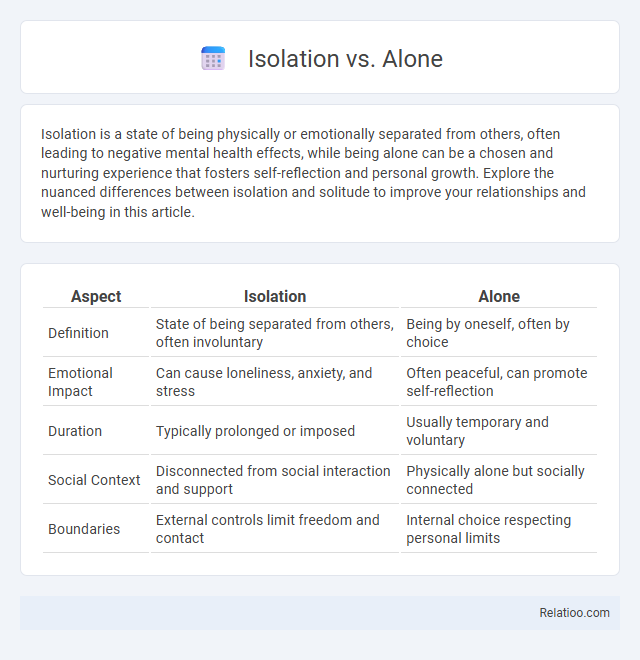Isolation is a state of being physically or emotionally separated from others, often leading to negative mental health effects, while being alone can be a chosen and nurturing experience that fosters self-reflection and personal growth. Explore the nuanced differences between isolation and solitude to improve your relationships and well-being in this article.
Table of Comparison
| Aspect | Isolation | Alone |
|---|---|---|
| Definition | State of being separated from others, often involuntary | Being by oneself, often by choice |
| Emotional Impact | Can cause loneliness, anxiety, and stress | Often peaceful, can promote self-reflection |
| Duration | Typically prolonged or imposed | Usually temporary and voluntary |
| Social Context | Disconnected from social interaction and support | Physically alone but socially connected |
| Boundaries | External controls limit freedom and contact | Internal choice respecting personal limits |
Understanding Isolation vs Being Alone
Isolation refers to a state of separation imposed externally or chosen, often leading to limited social interaction and potential negative mental health effects. Being alone is a neutral condition of physical solitude, which can be voluntary and beneficial for self-reflection, creativity, or relaxation. Understanding isolation versus being alone involves recognizing that isolation carries emotional or psychological consequences, whereas being alone can be a positive and intentional experience.
The Psychological Impact of Isolation
Isolation refers to a state where a person is separated from others, often involuntarily, which can lead to significant psychological impacts such as increased feelings of loneliness, anxiety, and depression. Being alone is a voluntary choice to spend time by yourself, which can foster self-reflection and mental clarity if balanced correctly. Your mental health can suffer dramatically under prolonged isolation, making it crucial to recognize the difference and seek social connections to mitigate its negative effects.
The Benefits of Choosing Solitude
Solitude offers profound mental health benefits by allowing your mind to recharge and reflect without the distractions of social interaction, promoting deep self-awareness and creativity. Unlike loneliness or mere aloneness, intentional isolation fosters emotional resilience and stress reduction through uninterrupted personal space. Embracing solitude can enhance your productivity and clarity, making it a powerful tool for personal growth and well-being.
Social Connections: Quality Over Quantity
Isolation occurs when an individual lacks social connections, often leading to negative mental health outcomes, whereas being alone is a voluntary state that can provide valuable solitude and self-reflection. Social connections emphasize quality over quantity, as meaningful relationships contribute significantly to emotional well-being and resilience against loneliness. Research shows that strong, supportive social bonds improve cognitive function and reduce the risk of depression more effectively than numerous superficial interactions.
Isolation and Mental Health Risks
Isolation, characterized by a lack of social contact and interaction, significantly impacts mental health, increasing the risk of depression, anxiety, and cognitive decline. Unlike being alone, which can be a voluntary and temporary state, isolation often refers to prolonged social disconnection that exacerbates feelings of loneliness and emotional distress. Studies show that chronic isolation disrupts brain function and hormone levels, leading to heightened stress and compromised psychological well-being.
Alone Time for Personal Growth
Alone time is a deliberate choice to spend moments by oneself, fostering self-reflection and personal growth through increased mindfulness and self-awareness. Unlike isolation, which often carries negative connotations related to social disconnection or loneliness, alone time encourages mental clarity and emotional rejuvenation. Prioritizing alone time supports emotional resilience, creativity, and a deeper understanding of individual goals and values.
Signs You’re Experiencing Unhealthy Isolation
Recognizing signs of unhealthy isolation involves noticing persistent feelings of loneliness, withdrawal from social activities, and declining mental health such as increased anxiety or depression. Unlike being alone, which can be a conscious, temporary choice for solitude and self-reflection, unhealthy isolation often leads to emotional distress and impaired social functioning. Persistent isolation disrupts emotional well-being and may require intervention through social support or professional help.
Strategies to Embrace Healthy Solitude
Isolation differs from being alone in its impact on mental health, as isolation often implies a lack of social connections, while being alone can foster reflection and creativity. Strategies to embrace healthy solitude include setting intentional alone time, engaging in mindfulness practices, and cultivating hobbies that promote self-discovery. Your ability to balance solitude with social interaction is key to enhancing emotional resilience and overall well-being.
Community Support vs Self-Sufficiency
Isolation often refers to a state of physical or emotional separation that can negatively impact your mental health, whereas being alone is a neutral condition that allows for self-reflection and personal growth. Community support provides essential social connections and shared resources, fostering resilience and emotional well-being, while self-sufficiency emphasizes independence and the ability to manage one's own needs without external assistance. Balancing community support with self-sufficiency ensures you maintain both meaningful relationships and personal empowerment.
Finding Balance Between Isolation and Alone Time
Isolation involves being separated from others, often leading to negative emotional effects, while alone time is a deliberate and positive choice to spend moments by oneself for self-reflection and rejuvenation. Finding balance between isolation and alone time requires recognizing the difference between involuntary disconnection and voluntary solitude, ensuring mental well-being and social connection are maintained. Prioritizing scheduled alone time can enhance creativity and reduce stress without the loneliness and anxiety associated with isolation.

Infographic: Isolation vs Alone
 relatioo.com
relatioo.com